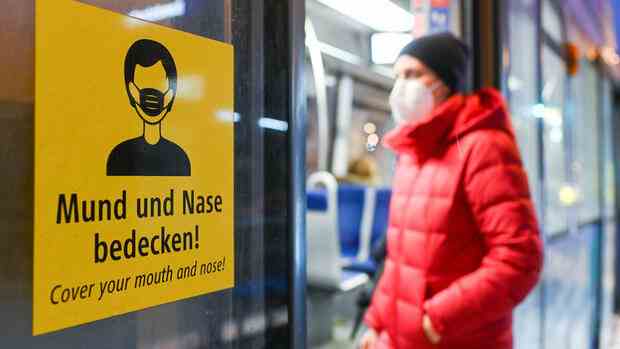Berlin After statements by prominent doctors about the end of the corona pandemic, calls for the lifting of existing restrictions are getting louder. Justice Minister Marco Buschmann (FDP) expresses a clear opinion on Twitter: If even the virologist Christian Drosten, who was one of the most cautious scientists, considers the pandemic to be over, then the last corona protective measures should be ended “as a political consequence”.
Drosten, who researches at the Berlin Charité, had explained in an interview with the “Tagesspiegel” that the first endemic corona wave would occur this winter and that, in his opinion, the pandemic would be over.
The President of the German Society for Internal Intensive Care Medicine and Emergency Medicine, Christian Karagiannidis, is also convinced that the pandemic can be declared over after this winter.
According to the Robert Koch Institute (RKI), the so-called seven-day incidence is currently 187.8. It indicates how many people per 100,000 inhabitants have been newly infected with Corona in the past seven days. However, experts have long assumed that the number of unreported cases is much higher because many of those affected no longer have their infection confirmed by a PCR test. Only then is the case recorded in the statistics.
Top jobs of the day
Find the best jobs now and
be notified by email.
The incidence could also be underreported because of the holidays, for example because fewer people visit a doctor or data is only passed on to the health authorities with a delay.
In addition to Corona, the health system is currently being burdened by an accumulation of respiratory diseases and an influenza epidemic, which started much earlier than in previous years. The RKI therefore continues to recommend wearing masks indoors and being vaccinated against Covid, influenza and pneumococci.
Lauterbach agrees with Drosten, but urges caution
“Christian Drosten is right that we have entered the endemic state of the corona waves, the waves only affect parts of the population,” said Federal Minister of Health Karl Lauterbach (SPD). Nevertheless, it is now still important to protect the people who are particularly at risk, for example by using masks in care facilities or by isolating at work. “The clinics are full, the staff is overwhelmed, excess mortality is high and winter is not over yet.”
The new Infection Protection Act, which the traffic light coalition had agreed on after a long dispute, has been in force since October 1st. Since then, wearing an FFP-2 mask has only been mandatory nationwide in clinics, medical practices, care facilities and on long-distance train services. Depending on the regional infection situation, the federal states can impose further measures, such as a mask requirement in local transport, in shops, restaurants or schools.
FDP sees itself confirmed by Drosten
Drosten’s statements support the FDP’s approach of limiting the protective measures to what is necessary, said the parliamentary director of the Liberals, Stephan Thomae, the Handelsblatt. “We managed to protect vulnerable groups and still make far-reaching easing.”
According to the Berlin doctor, Germany is experiencing the first endemic corona wave.
(Photo: imago images/photothek)
You now have to enter a new normality and learn to live with the virus without legally required protective measures. “Therefore, we should also lift the special measures of the Infection Protection Act, such as the obligation to wear masks in public transport, by next spring at the latest,” said Thomae.
Some federal states have already done this on their own. For example, passengers in local public transport in Bavaria and Saxony-Anhalt no longer have to wear mouth and nose protection, and in Schleswig-Holstein the mask requirement will fall in the new year.
The President of the German District Association, Reinhard Sager, would welcome it if these easing set a precedent. The mask requirement on the train is becoming increasingly difficult to convey, he told the newspapers of the Funke media group. If, according to leading physicians, the pandemic has been overcome, “further targeted decisions can now be made to lift restrictions,” emphasized Sager.
Medical Association President questions legal regulations
At the same time, however, there are also voices that continue to urge caution. Drosten’s statements gave hope, said the health policy spokeswoman for the SPD parliamentary group, Heike Baehrens. “At the same time, when dealing with Corona, we had to learn painfully that there is no reason to be careless about the virus, even when the omens are good.” You can see from the development in China that Corona is still not under control in other parts of the world.
>> Read the Tagesspiegel interview with Christian Drosten here: “The emergency situation in the clinics will last an agonizingly long time”
The current Infection Protection Act took into account a significant improvement in the corona situation, said Baehrens. She therefore advocates maintaining the path until the end of the regulations at the beginning of April. She considers a faster easing, as demanded by the Federal Minister of Justice, to be “premature”. However, the countries would have the measures to protect against infection in their own hands anyway.
The President of the German Medical Association, Klaus Reinhardt, appealed to people’s sense of responsibility to take a step back in the event of infections of any kind, to avoid crowds and to exercise caution. At the same time, however, he questioned on Deutschlandfunk “the extent to which we still need legal measures within the meaning of the Infection Protection Act”.
In the new year, the facility-related vaccination requirement will also fall. Staff in clinics, medical practices or care facilities will then no longer have to be vaccinated against Corona.
More: Polls: Majority of Germans are worried about 2023
